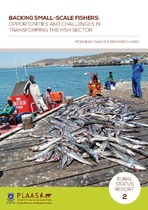| dc.contributor.author | Isaacs, Moenieba | |
| dc.contributor.author | Hara, Mafaniso | |
| dc.date.accessioned | 2019-04-02T10:26:16Z | |
| dc.date.available | 2019-04-02T10:26:16Z | |
| dc.date.issued | 2015 | |
| dc.identifier.citation | Isaacs, M. & Hara, M., 2015. Backing small-scale fishers: Opportunities and challenges in transforming the fish sector , Cape Town: Institute for Poverty Land and Agrarian Studies (PLAAS) | en_US |
| dc.identifier.uri | http://hdl.handle.net/10566/4598 | |
| dc.description.abstract | Globally, small-scale fisheries play a significant role in food security, poverty reduction and income generation (Béné et al 2007; Heck et al 2007; Béné et al 2010; FAO 2003). At the 2008 Global Conference on Small-Scale Fishing in Bangkok, Thailand, organised by the Food and Agriculture Organisation (FAO), it was indicated that small-scale fisheries contribute to more than half of the world’s marine and inland fish catch. The importance of this sector is further underlined as it employs over 95% of all men and women engaged in fisheries worldwide and that, of these, more than 90% are to be found in developing countries (FAO 2009). In Africa, it is estimated that the fishing sector provides income for over 10 million people engaged in fish production, processing and trade. And the sector contributes to the livelihoods and food security of over 200 million people on the continent1. In South Africa, however, fisheries have historically been dominated by the commercial marine sector. | en_US |
| dc.language.iso | en | en_US |
| dc.publisher | Institute for Poverty Land and Agrarian Studies (PLAAS) | en_US |
| dc.relation.ispartofseries | Rural Status Report;2 | |
| dc.subject | Small-scale fishers | en_US |
| dc.subject | South Africa | en_US |
| dc.title | Backing small-scale fishers: Opportunities and challenges in transforming the fish sector | en_US |
| dc.type | Other | en_US |

